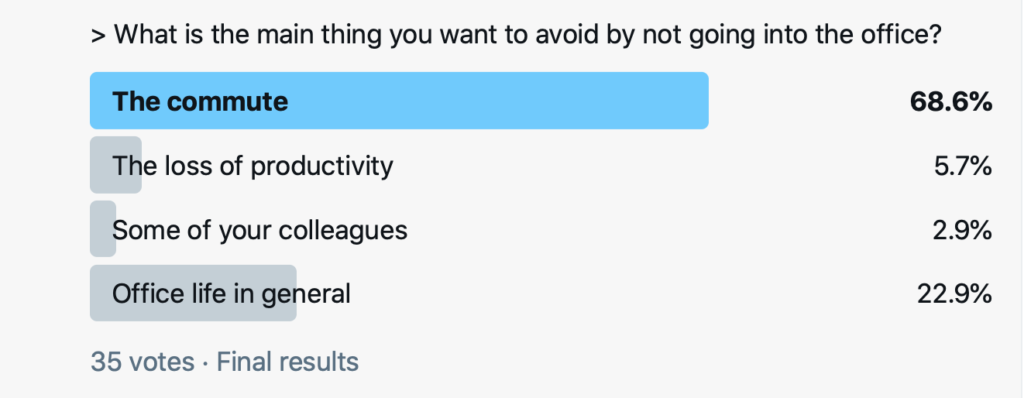
Working from home (WFH) is meant to be a cure-all for many of our office-based ills. Yet, as we slowly come out of the pandemic the reality is that WFH has created new challenges that are far from easy to navigate. Artificial Lawyer investigates.
The Hated Commute
Who enjoys commuting? Not many people, that’s for sure. And certainly very few who have to come into big financial centres such as London. As this very quick and naturally only indicative poll shows, commuting is the one thing that makes people want to stay at home and avoid the office more than anything else.

Clearly this is not scientific, but when mixed with feedback over decades of talking to peers, it rings true. The pandemic has enabled people to avoid the commute. So, everything is great, right? Not exactly.
Human behaviour is the result of a complex mix of interrelated and overlapping, and sometimes conflicting, drivers. When you insert the idea of not having to commute to do one’s work, this shakes up that delicate balance and has side effects. Such as:
- WFH tends to encourage people to seek out more space. If you and perhaps your partner are both WFH then moving further out, away from expensive and smaller homes in the centre of cities makes sense. Plus, if you move out you then get additional benefits, such as perhaps better schools for your children, more open space, a better standard of living in general. But……in turn, that then makes the commuting issue even worse.
- Once you’ve become accustomed to WFH, and especially if you’ve moved further away from the office, then commuting in becomes even more of a pain. Even if the demand is for just a couple of days a week it now feels like an imposition, an attack on one’s new peace and quiet, and not something you should naturally agree to.
- In turn that may drive some people to leave law firms and tech companies that insist on partial office attendance, meaning a loss of talent. That also means a movement of talent to those places that offer more WFH, or even full-time WFH.
- Some businesses have floated the idea that WFH staff may eventually earn less – perhaps to goad them back to the office. But, it will be interesting to see if and how they follow through with this – and also how that may have the opposite of the desired effect, and drive away staff.
- Also, if a law firm or tech company really did make it compulsory to work, for example, three days a week in the office, but you and your family have moved further away, what do you do? Where does the commute vs WFH equation balance out? The constant wrench of WFH, then office, each week, perhaps with those days always changing, could start to become a bit of a pain. When you had no choice about commuting you just did it – because you had to. Now, you are being constantly pulled in two directions.
The Productivity Challenge
Several people this site has spoken to with families say that their productivity has dropped since WFH. Others this site knows say the opposite, and that the office is in fact the cause of lost productivity, because of pointless meetings, delays caused by their commute, and generally the faff involved in office life.
Over the years Artificial Lawyer has also met people who quite openly admit that left to their own devices they will perform less well than when in a group in an office with a manager present. The quick poll above also showed that few people thought the office was a cause of productivity loss. Yet, others this site has met can’t stand to be managed in-person and do much better on their own, and so WFH has been a liberating experience. So, it’s a complex picture that reflects a multitude of personality types.
But, fundamentally, what does any business want? They want to make a healthy revenue and decent profits. That happens when their staff are productive.
So, now we have another paradox. Many people don’t want to commute, but also some of these may experience lower productivity by WFH. Others love the office and get more done there. But, how is the business to figure out what helps the bottom line the most? How does it decide who can WFH for five days a week, and those for three, and those who work in the office full-time?
What criteria are they using? What are the yardsticks they are using to measure good outcomes? It’s all very much up in the air still – and that will become more apparent as the pandemic recedes.

Conclusion
It’s clear to all that for most of us we are not going to be 100% all WFH, or 100% all at the office. The challenge is that this more complex picture has unsettled a way of living that has existed for many of us for decades.
Firms that think they can just say: ‘Right, you come to the office three days a week and all will be well,’ are kidding themselves. Some staff will opt to leave to avoid even those three days. And yet, another group will thrive in the office and find it hard to figure out why some of their teammates are so keen to avoid in-person meetings – and also wonder if they can rightfully demand those staff members commute in for what they see as an important meeting in the office.
In short, it’s all a bit messy. When most people worked from the office, with a few people allowed to WFH, things had an inherent stability. Now, things are flowing more freely, and because of that a little more chaotically.
Over the long-term it will no doubt find a new balance, but overcoming some of the WFH paradoxes over the next couple of years is going to be an interesting challenge.
—
By Richard Tromans, Founder, Artificial Lawyer, June 2021
The “Work Genie” is out of the bottle, and isn’t going back in. We won’t really know whether productivity was less or more (who can use a pandemic as a baseline anyway!).
All we can say is that work will now change forever, and #HybridWork is likely the new reality.